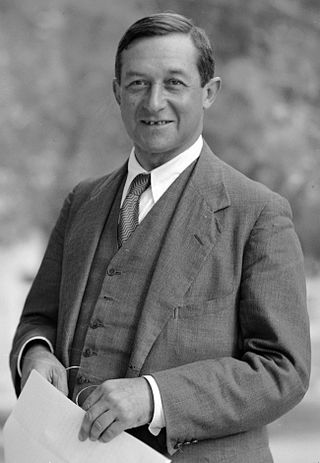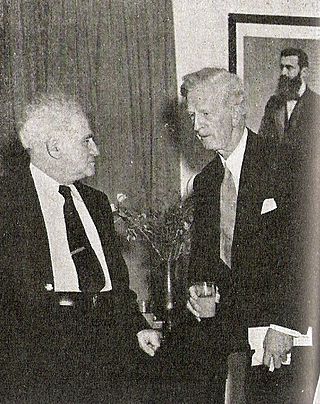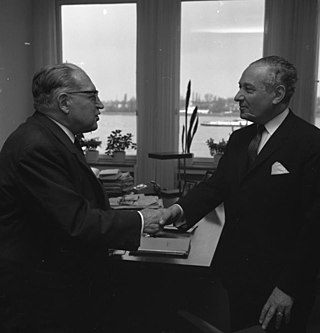Related Research Articles

The World Jewish Congress (WJC) was founded in Geneva, Switzerland in August 1936 as an international federation of Jewish communities and organizations. According to its mission statement, the World Jewish Congress' main purpose is to act as "the diplomatic arm of the Jewish people". Membership in the WJC is open to all representative Jewish groups or communities, irrespective of the social, political or economic ideology of the community's host country. The World Jewish Congress headquarters are in New York City, and the organization maintains international offices in Brussels, Belgium; Jerusalem; Paris, France; Moscow, Russia; Buenos Aires, Argentina; and Geneva, Switzerland. The WJC has special consultative status with the United Nations Economic and Social Council.
The Reparations Agreement between Israel and the Federal Republic of Germany was signed on September 10, 1952, and entered in force on March 27, 1953. According to the Agreement, West Germany was to pay Israel for the costs of "resettling so great a number of uprooted and destitute Jewish refugees" after the war, and to compensate individual Jews, via the Conference on Jewish Material Claims Against Germany, for losses in Jewish livelihood and property resulting from Nazi persecution.

Judah Leon Magnes was a prominent Reform rabbi in both the United States and Mandatory Palestine. He is best remembered as a leader in the pacifist movement of the World War I period, his advocacy of a binational Jewish-Arab state in Palestine, and as one of the most widely recognized voices of 20th century American Reform Judaism. Magnes served as the first chancellor of the Hebrew University of Jerusalem (1925), and later as its President (1935–1948).

Nazi plunder was organized stealing of art and other items which occurred as a result of the organized looting of European countries during the time of the Nazi Party in Germany.
The Conference on Jewish Material Claims Against Germany, or Claims Conference, represents the world's Jews in negotiating for compensation and restitution for victims of Nazi persecution and their heirs. According to Section 2(1)(3) of the Property Law of Germany, the Claims Conference is a legal successor with respect to the claims not filed on time by Jewish persons. This fact was reasserted in decisions of some lawsuits which attempted to redefine the Claims Conference as a "trustee" of these assets. These lawsuits were dismissed. The Claims Conference administers compensation funds, recovers unclaimed Jewish property, and allocates funds to institutions that provide social welfare services to Holocaust survivors and preserve the memory and lessons of the Holocaust. Julius Berman has led the organization as chairman of the board, and currently president, as of 2020.
Holocaust survivors are people who survived the Holocaust, defined as the persecution and attempted annihilation of the Jews by Nazi Germany and its allies before and during World War II in Europe and North Africa. There is no universally accepted definition of the term, and it has been applied variously to Jews who survived the war in German-occupied Europe or other Axis territories, as well as to those who fled to Allied and neutral countries before or during the war. In some cases, non-Jews who also experienced collective persecution under the Nazi regime are considered Holocaust survivors as well. The definition has evolved over time.

The Monuments, Fine Arts, and Archives Section Unit (MFAA) was a program established by the Allies in 1943 to help protect cultural property in war areas during and after World War II. The group of about 400 service members and civilians worked with military forces to protect historic and cultural monuments from war damage, and as the conflict came to a close, to find and return works of art and other items of cultural importance that had been stolen by the Nazis or hidden for safekeeping. Spurred by the Roberts Commission, MFAA branches were established within the Civil Affairs and Military Government Sections of Allied armies.

Norman de Mattos Bentwich was a British barrister and legal academic. He was the British-appointed attorney-general of Mandatory Palestine and a lifelong Zionist.

James Grover McDonald was a United States diplomat. He served as the first U.S. Ambassador to Israel.

The Holocaust had a deep effect on society both in Europe and the rest of the world, and today its consequences are still being felt, both by children and adults whose ancestors were victims of this genocide.

The Hungarian Gold Train was the German-operated train during World War II that carried stolen valuables, mostly Hungarian Jews' property, from Hungary towards Berlin in 1945. After American forces seized and looted the train in Austria, almost none of the valuables were returned to Hungary, their rightful owners, or their surviving family members.

The Bavarian State Painting Collections, based in Munich, Germany, oversees artwork held by the Free State of Bavaria. It was established in 1799 as Centralgemäldegaleriedirektion. Artwork includes paintings, sculptures, photographs, video art and installation art. Pieces are on display in numerous galleries and museums throughout Bavaria.
Kurt May (1896–1992) was director of the United Restitution Organization, which assisted victims of Nazism, from its inception in 1948 to his retirement at age 91, in 1988.
Uro or URO may refer to:
The Holocaust Era Asset Restitution Taskforce or Project HEART (2011-2014) was a Holocaust restitution project that was created by a decision of the Israeli Government to locate Holocaust victims and their heirs and the property that was taken from them during the Holocaust and to assist in obtaining restitution for that property. Restitution would have been sought using databases containing the data submitted by Holocaust victims and their heirs and information about the property that was taken from them. Those who were interested in participating were directed to fill out a questionnaire to determine their eligibility and may also have accessed a website and call center for assistance. Questionnaires had been collected and processed by an administrator and then forwarded to the Israeli Government, which had planned to negotiate with the relevant Governments, companies and others who hold Holocaust assets. This project used innovations, such as the Internet, not used in previous restitution attempts and marked the most serious attempt at obtaining restitution for aged Holocaust victims and their heirs. By April 2014 the project lost 95% of its funding, is accepting no requests, and it has eventually been absorbed into the Israeli Ministry of Senior Citizens, from which the funding into the project were coming.
The Jewish Restitution Successor Organization Inc. was founded in 1947 in New York by various American and international Jewish organizations. Originally, it was incorporated on May 15, 1947, as the Jewish Restitution Commission, but in 1948 changed its name to the Jewish Restitution Successor Organization at the request of American military authorities.

Curt C. Silberman was a German-Jewish and American attorney, community leader, and member of Jewish organizations in both Germany and the United States. Born Kurt Leo Silbermann in Würzburg, Germany, he and his wife Else fled due to the rampant antisemitism in Nazi Germany and settled in New Jersey. His legal career in the United States focused on restitution work for the victims of the Nazi government.

Museum de Fundatie is a museum for the visual arts in Zwolle, Netherlands. Museum de Fundatie forms part of the Hannema-de Stuers Foundation, to which Kasteel het Nijenhuis in Heino also belongs. Museum de Fundatie possesses a collection of visual arts, with works ranging from the end of the Middle Ages until the present day, collected by Dirk Hannema, former director of Museum Boijmans Van Beuningen. As well as the permanent collection, Museum de Fundatie organises new, wide-ranging exhibitions every three months. Museum de Fundatie recorded a record number of 310,000 visitors in 2015.

Many priceless artworks by the Dutch post-impressionist artist Vincent van Gogh were looted by Nazis during 1933–1945, mostly from Jewish collectors forced into exile or murdered.
References
- ↑ Bentwich, Norman (2008), "UNITED RESTITUTION ORGANIZATION (URO)", Jewish Virtual Library, retrieved 2013-07-25
- ↑ "United Restitution Organization." Encyclopedic Dictionary of Judaica. Wigoder, Geoffrey, ed. New York; Paris: Leon Amiel, 1974. p. 609.